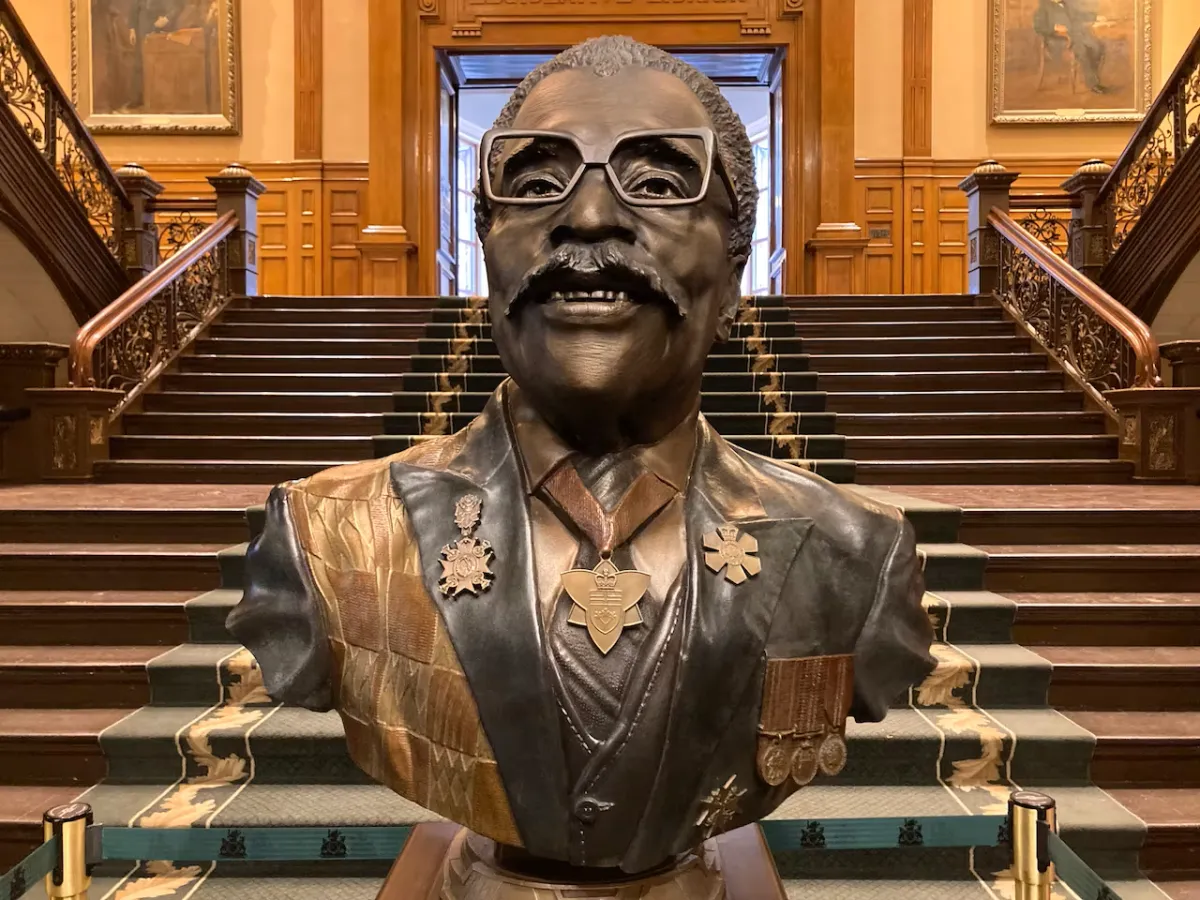
Lincoln Alexander
“Anyone can become a great part of the Canadian way of life and make a difference economically, politically and socially. Don’t get sucked in by saying you can’t because there’s always a future in this great country of ours if you work hard and stay in school. There’s no job you can’t have if you want it bad enough and have confidence in yourself.” - Lincoln Alexander
This is a 4-part series that was originally posted on LinkedIn about a Canadian icon, Lincoln Alexander. Mr. Alexander was a prominent Black Canadian politician and he had a lot to say about the power of education and diversity.
If you missed the carousel on LinkedIn, you can download it here.
-Igor Ristevski
Who He Was

Lincoln Alexander was a trailblazing Black politician who made Hamilton, Ontario his home and served us well.
He experienced racism for much of his life and how he dealt with it as a leader can be a source of motivation for anyone who faces injustice.
But who was he?
Hamiltonians are very familiar with him. We have a law firm, theatre, and a highway affectionally called "The Linc" named after him. Additionally, five schools in Ontario bear his name (one is a law school).
Mr. Alexander was a son of Caribbean immigrants, an army veteran, a lawyer, a Progressive Conservative politician, a university chancellor, and an executive for the Workers Compensation Board.
While he served Hamilton, his early years were in Toronto, which was a lonely one. He was the only Black child in his kindergarten class and he only knew of a handful of Black families growing up.
His mother was the biggest influence on his life, pushing him to strive for more.
He has numerous accomplishments such as:
1. First Black Member of Parliament (MP) in 1968
2. First Black federal Cabinet Minister in 1979
3. First Black chairman of the Worker's Compensation Board in 1980
4. First Black Lieutenant Governor of Ontario in 1985
5. Longest serving chancellor for the U. of Guelph with 5 terms served
He dedicated his life to fighting racial discrimination so we could all live in a just and humane society.
For a man so accomplished, how many non-Canadians do you think have heard of him?
The Importance of Education

“Education is the key to unlocking our full potential, both as individuals and as a society.” - Lincoln Alexander
Shaped by his mother's belief that education would open up new pathways to him and indeed a new future, Lincoln Alexander's leadership style was characterized by continuous learning.
This belief was so sincerely held by him that he titled his memoir "Go To School, You're A Little Black Boy".
But what kind of doors would open to a Canadian Black man who was the son of immigrants from the West Indies in the 1950s? His father was a carpenter but that trade was closed to Black men, so he found work as a labourer for a rail company; his mother was a maid.
When Mr. Alexander lived in Harlem briefly, he was exposed to successful Black men who held white-collar jobs.
Mr. Alexander realized that education was a way forward to a better and more impactful life. But he probably did not realize to what extent.
He needed to gain important knowledge and skills from school, university, law school, and the Royal Canadian Air Force.
History, law, logic, rhetoric, discipline, and confidence.
These were all necessary if he wanted to help create a more just and equitable society.
Lincoln Alexander would create change by joining the system that was closed to his father and hostile to him. He earned his seat at the table through education.
The power of education is that it can supersede any labels society places on us.
Fearless Leadership

As a leader who seeks to make a lasting change in society, it's not enough to be educated. You will hit a wall unless you have confidence and conviction.
To Lincoln Alexander, this meant taking a stand even when your position was an unpopular one.
He did this many times in his life.
As a law student at Osgoode Hall, he stood up in class and called out his law professor for using a racial slur that was disparaging to Black people.
Mr. Alexander questioned his law professor's leadership and he thought that he'd be failed by him for speaking the truth to power.
Luckily, he wasn't.
Mr. Alexander also broke with his Progressive Conservative Party quite a bit if he felt they were on the wrong side of an issue.
For example, the Progressive Conservative Party was against an anti-hate legislation bill because they thought that it would restrict free speech.
Mr. Alexander dissented stating how ridiculous the argument was that someone could call his son or daughter a racial slur and hide behind "free speech". Thankfully, he was supported by Heath MacQuarrie, an MP from PEI.
This is how Lincoln Alexander earned his reputation as an honest man full of integrity.
He said that he needed to "always walk tall, and with a certain bearing, so people knew I meant business".
When you stand up for justice, it may be a lonely battle and you need the courage to prepare yourself for that.
Legacy

Lincoln Alexander's legacy is a reminder that our personal successes, no matter how historic, are not nearly as important as the lives we touch while we are on this earth.
Moreover, we are reminded that you can improve people's lives indirectly through years of public service and advocacy.
Exercising power and influence can be a good thing if it is done for the benefit of others.
The two things Mr. Alexander was passionate about were education and racial equality. He often remarked how Canada was the best country on earth but it wasn't perfect.
Being subject to racism, he experienced how it could affect any Black Canadian even if they were educated and successful like himself.
This was not a future he wanted to leave to his grandchildren.
That is why this so-called right-wing politician made it his life's work to advocate not only for racial equality but education too.
Education improved lives.
Racial equality improved society.
His quest remained unfinished but the progress that he made was great.
When you think of your purpose, please consider the impact you will have on your community and not yourself.
Fifty years from now, historians will write very little about influencers and billionaires.
And whatever they do write, it likely won't be positive.
Touch someone's life today through an act of service.
Your legacy depends on it.
Additional Resources
https://www.thecanadianencyclopedia.ca/en/article/lincoln-maccauley-alexander
https://en.wikipedia.org/wiki/Lincoln_Alexander
Lincoln Alexander is another reason why Black History should not be restricted to just one month. His life touched and impact many Canadians of all ethnic backgrounds and we can all learn from his example of his service.
l I'd love to hear your insights, so please feel free to connect with me on LinkedIn and send me a DM by clicking here.
-Igor Ristevski
